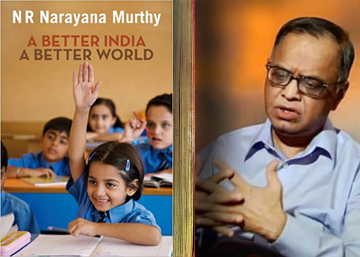A Better India, A Better World
The author of this book N.R.Narayana Murthy (NRM) needs no introduction to Indian readers. The principal founder of the well–known IT major Infosys, NRM is one among the most respected corporate leaders of India. This book is a collection of NRM’s talks given to various institutions in India and abroad in a variety of topics like education, leadership, nation-building, poverty, development, management. Bill Gates describes the book as “A timely message about the importance of values and leadership in business.”
In the first talk delivered to students of the Stern School of Business, New York University, on Learning form Experience NRM provides a glimpse of the success story of Infosys from a small Indian IT vendor to a multibillion dollar, global, software power-house. He talks about the crucial decision he took which made Infosys what it is at present. When an offer was made to sell Infosys for $1 million and all other partners of the company were favourable to it, NRM stood against it and convinced them not to sell, a classic example to show what effective leadership can do and an important quality of leadership – the ability or willingness to renounce a short-term gain for long–term goals. In this speech, talking about learning form experience, NRM makes the following interesting observations
“As I think across a wide variety of settings in my life, I am struck by the incredible role played by the interplay of chance events with intentional choices. While the turning points themselves are indeed often fortuitous, how we respond to them is anything but so. It is this very quality of how we respond systematically to chance events that is crucial.”
This brings us to the question is there something like “chance” or “fortuitous event”? Indian seers and sages with a deeper spiritual vision perceived that what appears to be chance, fortune or fate are the outer results of unseen and invisible causes. They saw two major factors behind all events. First, at the highest level, it is the Divine Power and Wisdom which governs the world. Second, at a lower level, Law of Karma which determines the consequences of our actions. The environment in which we are placed, events we encounter and the experiences we go through in our present birth are the results of our past actions and what NRM says, the nature or quality of our responses to the “chance” or “fortuitous” events is one of the factors which will determine our future destiny.
Coming back from the philosophical digression to the book under review, the main theme which recur constantly in NRM’s speeches and repeatedly emphasized as the key factors for building a better India and a better world are values, excellence, leadership, entrepreneurship, innovation implementation, giving back to the society. This book as a whole provides useful perspectives on a wide range of issues which can be of great help to people from all walks of life and in all stages in their career or life – from the student in the B-school and the young man or woman in the beginning of their career, to the senior professional, manager, administrator or politician.
M.S.Srinivasan

